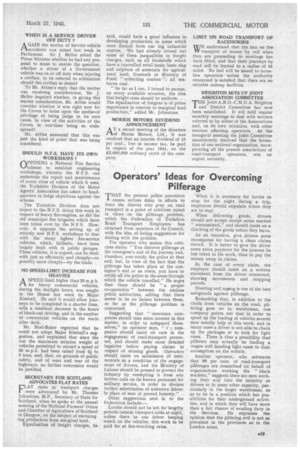WHEN IS A SERVICE DRIVER OFF DUTY?
Page 21

If you've noticed an error in this article please click here to report it so we can fix it.
AGAIN the matter of Service-vehicle accidents was raised last week in Parliament. Sir J. Mellor asked the Prime Minister whether he had any proposal to make to enable the question, whether a driver of a Government vehicle was on or off duty when injuring a civilian, to be referred to arbitration should the civilian so desire?
To Mr. Attlee's reply that the matter was receiving consideration, Sir J. Mellor inquired whether, in giving this matter consideration, Mr. Attlee would consider whether it was right now for the Crown to insist upon the mediwval privilege of being judge in its own cause, in view of the activities of the Crown in war-time being so wide spread?
Mr. Attlee answered that this was just the kind of point that was being considered.
SHOULD N.F.S. HAVE ITS OWN . WORKSHOPS? WORKSHOPS?
OPPOS1NG a National Fire Service scheme to establish engineering workshops, whereby the N.F.S. can undertake the repair and maintenance of every class of vehicle which it uses, the Yorkshire Division of the Motor Agents' Association has asked its headquarters to lodge objections against the scheme.
The Yorkshire Division does not object to the N.F.S. doing this work in respect of heavy fire-engines, as did the old municipal fire brigades which have been taken over by the N.F.S. However, it opposes the setting up of entirely new N.F.S. workshops to deal with the many lighter fire-service vehicles, which, hitherto, have been largely dealt with in public garages. These vehicles, it is argued, can be dealt with just as efficiently and cheaply—or possibly more cheaply—by the trade.
NO SPEED-LIMIT INCREASE FOR HEAVIES
ASPEED limit higher than 20 m.p.h. for heavy commercial vehicles, during the daylight hours, was sought in the House last week by Major Kimball. He said it would allow journeys to be completed in a shorter time, with a resultant decrease in the hours of black-out driving, and in the number of commercial vehicles on the roads after dark.
Mr. Noel-Baker regretted that he could not adopt Major Kimball's suggestion, and explained that since the war the maximum unladen weight of vehicles permitted to exceed a speed of 20 m.p.h. had been raised from 2i to 3 tons, and, that, on grounds of public safety, and of wear and tear of the highways, no further concession would be justified.
SECRETARY FOR SCOTLAND ADVOCATES FLAT RATES
FLAT rates in transport charges were advocated by Mr. Thomas Johnstone, M.P., Secretary of State for Scotland, when he spoke at the annual meeting of the National Farmers' Union and Chamber of Agriculture of Scotland in Glasgow, on the subject of encouraging production from marginal land.
Equalization of freight charges, he said, would have a great influence in developing production in areas which were distant from our big industrial centres. We had already ironed out some of these inequalities in freight charges, such as all foodstuffs which have a controlled retail basis; basic slag and sulphate of ammonia for agricultural land; livestock at Ministry of Food " collecting .centres "; all seaborne coal.
" So far as I can, I intend to pursue. on every available occasion, the idea that freight rates should be uniform. . The equalization of freights is of prime importance in relation to marginal land production," added Mr. Johnstone.
MORRIS MOTORS DIVIDEND ANNOUNCEMENT
AT a recent meeting of the directors of Morris Motors, Ltd., it was resolved that an interim dividend of 10 per cent., free of income tax, be paid in respect of the year 1941, on the £2,650,000 ordinary stock of the company.
LIMIT ON ROAD TRANSPORT OF RACEHORSES WE understand that the ban on the W transport of horses by rail when they are proceeding to meetings has been lifted, and that their journeys by road will be limited to a radius of 45 mileg. No fuel will be issued to horsebox operators unless the authority concerned is satisfied that there are no suitable railway facilities.
BRIGHTON SETS UP JOINT ASSOCIATION COMMITTEE
THE Joint A.R.0.-C.M.U.A. Brighton and District Committee has now been established. It will hold regular rnonthly meetings to deal with matters referred to by either of the Associations and, on its own initiative, with other matters affecting operators. At the inaugural meeting the Joint Committee unanimously resolved that the formation of one national organization, incorporating all the present associations of road-transport operators, was an urgent necessity.




















































